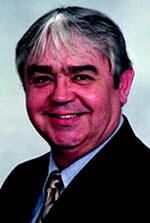A Civil Rights Attorney Makes the Case for Native Americans in Law
 One of U.S. Justice Department attorney Lawrence Baca’s most vivid memories of childhood are the scars on his father’s chest. A fullblooded Pawnee Indian, Baca’s father was stabbed 27 times when he accidentally went into a “white’s only” bar in 1939. His attackers were never charged. As everyone from the sheriff to the attorneys in the state attorney general’s office was white, there was little hope for justice for a Native American in that time and place.
One of U.S. Justice Department attorney Lawrence Baca’s most vivid memories of childhood are the scars on his father’s chest. A fullblooded Pawnee Indian, Baca’s father was stabbed 27 times when he accidentally went into a “white’s only” bar in 1939. His attackers were never charged. As everyone from the sheriff to the attorneys in the state attorney general’s office was white, there was little hope for justice for a Native American in that time and place.
This memory drove Baca to law school, and is still the basis of his mission: to attract Native Americans and other minorities to the practice of law.
“It’s important to see people of all color,” Baca stresses. The presence of minorities in the courtroom is crucial to the realization of justice, he believes, noting that people are more comfortable and more confident that they’re getting a fair hearing if there are others there like them. (Baca refers to himself as an Indian rather than a Native American as he grew up with the term and he’s more comfortable with it. He also notes that the word “Indian” is used in the Constitution and is, therefore, he says sardonically, our “legal” name.)
Baca grew up in El Cajon, California, and was the first Native-American attorney ever hired by the U.S. Justice Department’s Civil Rights Division when he joined 26 years ago.
Since then, he has devoted his career to racial justice and ethnic diversity, filing more civil rights cases on behalf of Native Americans than any other attorney in the division, although his cases have been on behalf of minorities of all races. But he laments that in 26 years of trying civil rights cases for the Justice Department, he has appeared before only one minority judge.
For Native Americans, representation is especially crucial. As the only race to have a whole section of the U.S. Code devoted to them—Title 25—Native Americans have rights of sovereignty and have been the subject of thousands of federal court cases.
According to Baca, in the last decade, the Supreme Court has heard more cases involving federal Native American law than any other unique area of law. “Because we’re so affected by law, it is extremely important for us [to have American Indian judges and lawyers],” Baca said.
Baca has had a leadership role in the recruitment of minorities to the legal profession, such as his recent appointment as chair of the American Bar Association’s Committee on Racial and Ethnic Diversity in the Profession. With numerous awards for his efforts to advance the cause of minorities and promote diversity, Baca says that the 25 or so Native-American lawyers who followed him to work at the Justice Department have been “the greatest compliment to my work.”
A leading figure in the establishment of national conferences on Native American law, Baca is a speaker in demand. When appearing at high schools or colleges, he constantly tries to recruit minorities into the profession, and even provides his phone number to anyone who might be interested in becoming a lawyer. On occasion, he has found that his message inspired someone to become a successful attorney. This, and his role as a civil rights attorney, gives him his greatest satisfaction.
“What more could I ask for than to make someone else’s life better because of what I do?”
With pride in his heritage and confidence in the future, Baca is poised to make a difference for Native Americans in the legal system, as well as the system as a whole.
Tom Calarco is a freelance writer from Schenectady, N.Y. His book The Outpost to Freedom, a History of the Underground Railroad in Upstate New York, is set for publication in 2003.
From the November 2002 issue of Diversity & The Bar®
